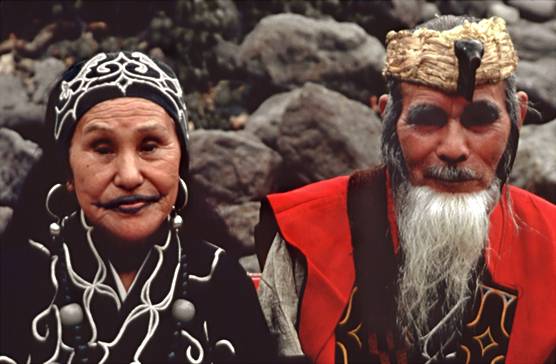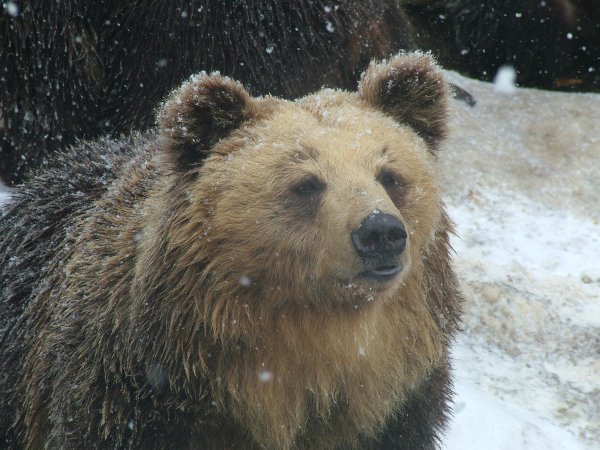Japan Today carries news of a new political party planned by an Ainu activist…
*******************************************************************************************************************************************

Ainu Couple (Univ. of Minnesota website)
Fairer-skinned and more hirsute than most Japanese, the Ainu traditionally observed an animist faith with a belief that God exists in every creation—trees, hills, lakes, rivers and animals, particularly bears.
Ainu men kept full beards while women adorned themselves with facial tattoos which they acquired before they reached the age of marriage. Ainu clothes were robes spun from tree bark and decorated with geometric designs.
But like many indigenous groups around the world, most of Japan’s 24,000 Ainu have lost touch with their traditional lifestyle after decades of forced assimilation policies that officially banned their language and culture, leaving them a disadvantaged minority in modern Japan.
Earlier figures have pegged the number of Ainu at about 70,000 but the real figure is unknown since many have integrated with mainstream society and some have hidden their cultural roots.
“We think what is necessary for modern Ainus is our participation in politics,” said Kayano, who now curates a museum of Ainu heritage in Hokkaido. “Given the current political turmoil, I expect maybe we’ll have a chance.”
“If I’m elected, I’d like to work on introducing Ainu language classes in elementary and middle schools—I believe we will be able to recover our language.”
But Kayano, whose father was the only Ainu lawmaker in Japan’s history, has his sights on more than just reviving his ethnic group’s traditions and all-but-extinct language. He wants the Ainu to be granted their traditional homeland of Hokkaido island—now a popular spot for skiing and wilderness-seeking tourists—and even some two-thirds of Japan’s territory, mostly national parks.
Historically, the Ainu dominated Hokkaido until the 19th century when Japanese were encouraged to settle there, pushing the Ainu off their land and further to the periphery.
Kayano acknowledged that his vast land claims idea was unlikely to succeed, and it was not even part of his new party’s manifesto. “I know it’s a long shot, but nothing will begin without starting to say a word,” Kayano said.
(See the full article.)
****************************************************
The Bear Clan
This legend about how Ainu are descended from the Bear comes from the informative Island of the Spirits website.
“In very ancient times there lived two people who were husband and wife. The husband one day fell ill and soon after died, leaving no children, so that the poor wife was left quite alone. Now it happened to have been decreed that the woman was at some future time to bear a son. When the people saw that the time for the child to be born was nigh at hand, some said, ‘Surely this woman has married again.’ Others said, ‘Not so, but her deceased husband has risen from among the dead.’ But the woman herself said that it was all a miracle, and the following is [her] account of the matter:
“‘One evening there was a sudden appearance in the hut in which I was sitting. He who came to me had the external form of a man and was dressed in black clothing. On turning in my direction he said, “O, woman, I have a word to say to you, so please pay attention. I am the god who possesses the mountains (i.e., a bear) and not a human being at all, though I have now appeared to you in the bodily form of a man. The reason of my coming is this. Your husband is dead, and you are left in a very lonesome condition. I have seen this and am come to inform you that you will bear a child. He will be my gift to you. When he is born you will no longer be lonely, and when he is grown up he will be very great, rich, and eloquent.” After saying this he left me.’
“By and by this woman bore a son, who in time really became a mighty hunter as well as a great, rich, and eloquent man. He also became the father of many children. Thus it happens that many of the Ainu who dwell among the mountains are to this day said to be descended from a bear. They belong to the bear clan, and are called Kimun Kamui sanikiri—i.e., ‘descendants of the bear.'”
************************************************************************************************************************
The Smithsonian has an online tour of its breakthrough 1999 exhibition on Ainu, including a revealing description of the Ainu bear ceremony here.
There’s also an extensive website on Ainu on this Japan Focus page, which suggests links with other groups on the Pacific Rim.


Leave a Reply